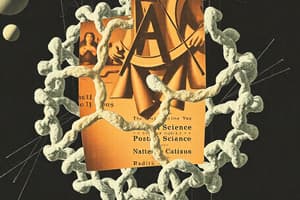Podcast
Questions and Answers
When is the Nobel Prize in Chemistry awarded?
When is the Nobel Prize in Chemistry awarded?
- Biennially on 5 November
- Quarterly on 15 January
- Every five years on 20 February
- Annually on 10 December (correct)
Who administers the Nobel Prize in Chemistry?
Who administers the Nobel Prize in Chemistry?
- The Nobel Committee for Chemistry
- The Nobel Foundation (correct)
- The Royal Swedish Academy of Sciences
- The Nobel laureates
How many women have won the Nobel Prize in Chemistry as of 2022?
How many women have won the Nobel Prize in Chemistry as of 2022?
- Eight (correct)
- Twelve
- Two
- Fifteen
Who was the first recipient of the Nobel Prize in Chemistry?
Who was the first recipient of the Nobel Prize in Chemistry?
What was the reason for awarding the 2023 Nobel Prize in Chemistry?
What was the reason for awarding the 2023 Nobel Prize in Chemistry?
What type of bond results from the sharing of electrons?
What type of bond results from the sharing of electrons?
What type of force is responsible for dipole–dipole interactions?
What type of force is responsible for dipole–dipole interactions?
What theory explains the optimal distance between bonded nuclei?
What theory explains the optimal distance between bonded nuclei?
Which theory allows chemists to predict the strength, directionality, and polarity of bonds?
Which theory allows chemists to predict the strength, directionality, and polarity of bonds?
What type of bond is formed due to the electrostatic force between oppositely charged ions?
What type of bond is formed due to the electrostatic force between oppositely charged ions?
Flashcards are hidden until you start studying
Study Notes
Nobel Prize in Chemistry
- Awarded annually, typically announced in early October.
- Administered by the Royal Swedish Academy of Sciences.
Achievements in Chemistry
- As of 2022, only seven women have won the Nobel Prize in Chemistry.
- The first recipient of the Nobel Prize in Chemistry was Jacobus Henricus van 't Hoff in 1901.
Recent Awards
- The 2023 Nobel Prize in Chemistry was awarded for significant advancements in the field. (Specific contributions not detailed.)
Chemical Bonds and Interactions
- A covalent bond results from the sharing of electrons between atoms.
- Dipole–dipole interactions are caused by electrostatic forces between polar molecules.
Theoretical Foundations
- The Valence Shell Electron Pair Repulsion (VSEPR) theory explains the optimal distance between bonded nuclei.
- Molecular Orbital Theory allows chemists to predict bond strength, directionality, and polarity.
Ionic Bonding
- An ionic bond forms due to the electrostatic force between oppositely charged ions.
Studying That Suits You
Use AI to generate personalized quizzes and flashcards to suit your learning preferences.



